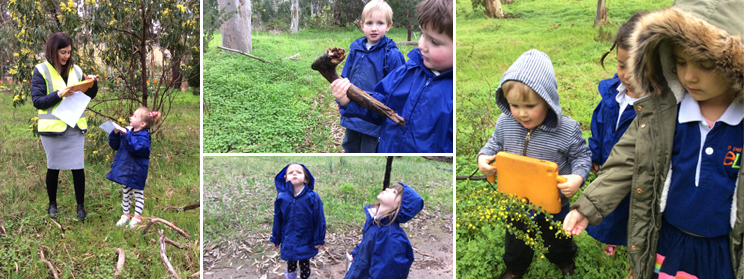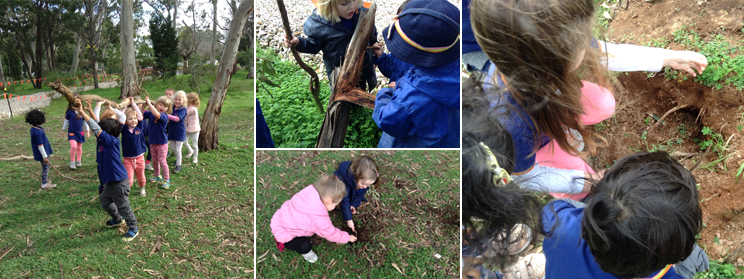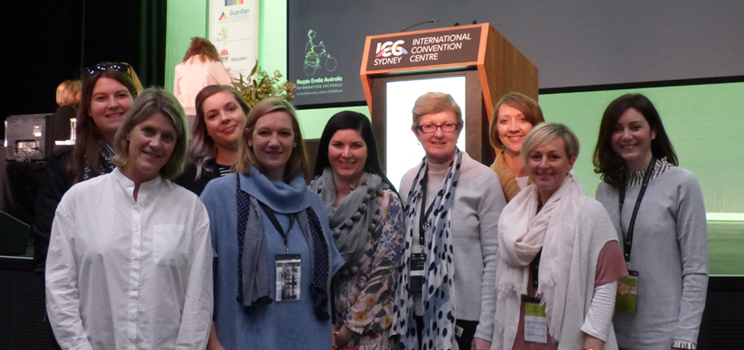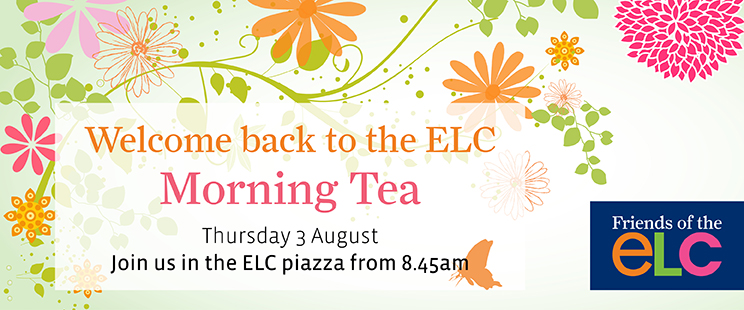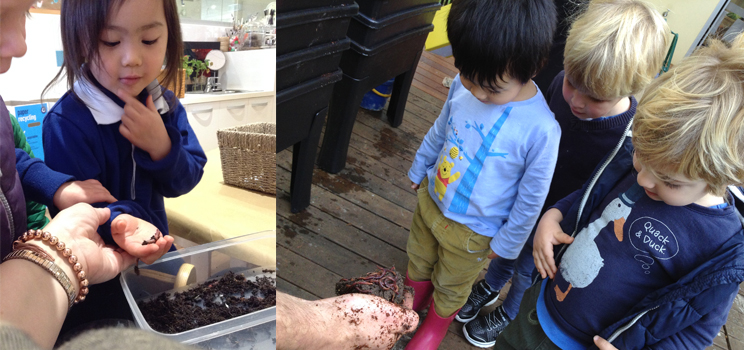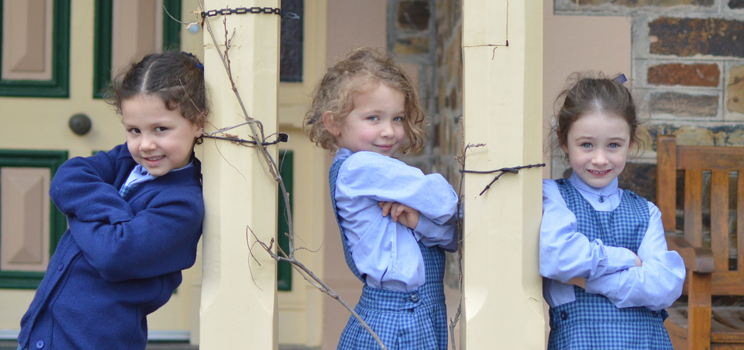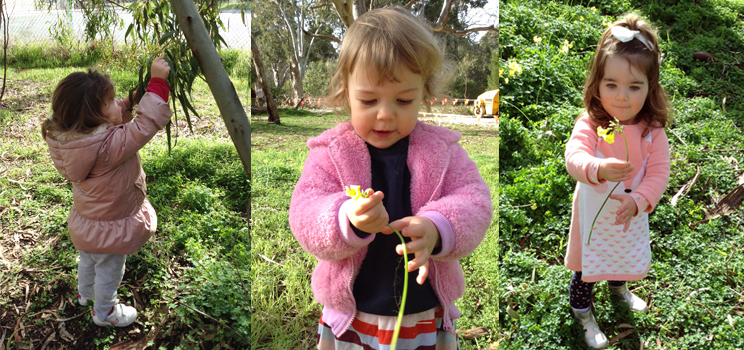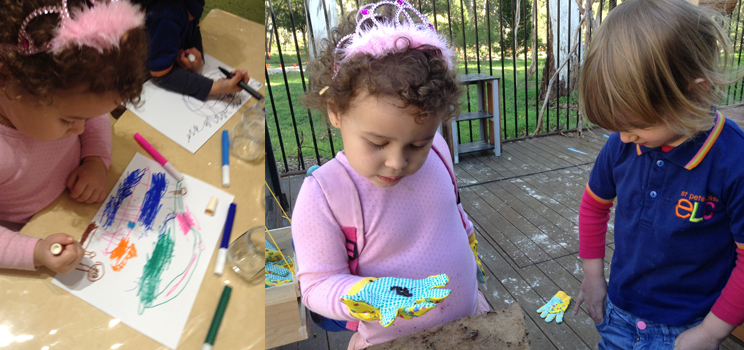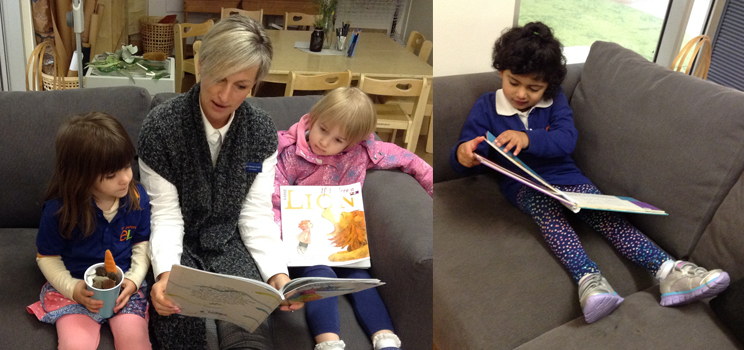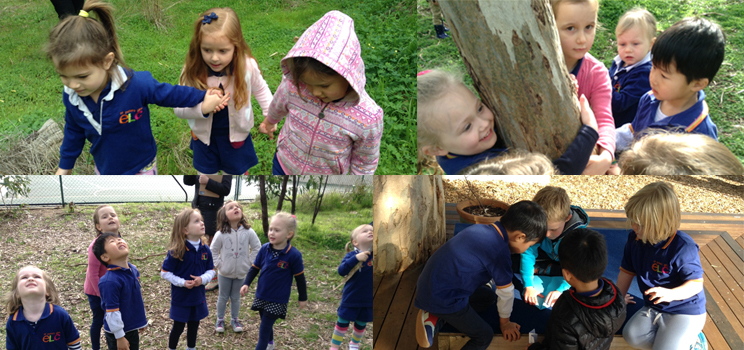From the Director of Early Learning
Dear Families,
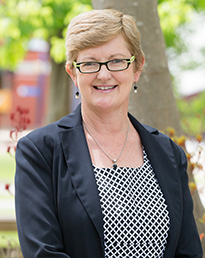
As we enjoy Week 6 of term, we celebrate another opportunity to bring our community together with our Father’s Day Breakfast. It is really special to be able to host community events that are clearly welcomed by families as an opportunity to be involved in your children’s lives. Arguably one of our favourite events, a breakfast brings us together first thing in the morning, our young friends are fresh and alert, proud to be hosting their family in their space.
It does seem significant that bringing families together in the children’s learning space promotes partnership and a sense of pride with place. It is like building a bridge between the child’s two worlds. We sometimes take for granted the enormous adjustments a child makes from their home to our setting, they are encountering new things, different people and are adjusting their normal life to incorporate us. The separation from family can create anxiety so it is essential we build trust into this union.
So for those of you who were able to attend our special breakfast or who plan to attend future events, we say thank you! We are thanking you for the critical role we play, as the adults in their lives, at understanding the holistic picture of the child’s life and trying really hard to combat any fragmentations with this emphasis on relationships.
In two weeks we will invite our extended families into the Centre for a Grandparents and Special Friends’ Afternoon Tea. We encourage all families to find someone who can come along with their child to this event and participate in what will be one of our largest ELC gatherings for 2017. The date is Wednesday 13 September at 2pm.
Kate Mount
Director of Early Learning
Important dates to remember
Wednesday 30 August 6.30pm: Dr Tom Nehmy seminar
Thursday 31 August 9am: Dr Tom Nehmy workshop
Monday 4 September 5pm: Reception Twilight Tour
Wednesday 13 September 2pm: ELC Grandparents and Special Friends’ Afternoon Tea
Monday 18 September – Wednesday 20 September: ELC Parent-Teacher Conversations
Friday 29 September: Term 3 Concludes
Tuesday 3 October: Vacation Care Commences
Friday 13 October: Vacation Care Concludes
Monday 16 October: Term 4 Commences
A letter from Ms Qian
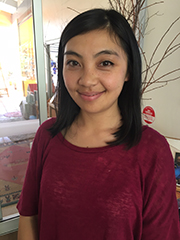 尊敬的家长:
尊敬的家长:
转眼本学期已经过半,通过孩子们在elc的表现以及家长们对elc社区活动的参与,我很高兴地看到了大家对新学期的参与和适应度正在提高,这也正是elc对咱们广大中国家庭的期许!
接下来我们为大家准备了两场社区活动--今天的父亲节早餐和9月13日(星期三)下午两点的祖父母及特别朋友下午茶。
我们都知道家庭成员在孩子的教育中发挥着非常重要的作用,因此我们希望借着社区活动的机会能让家庭成员们也参与到孩子们的日常学习中来,同时也希望能利用这个美好的时间段提升您和孩子的互动并留下美好的回忆瞬间!
我代表elc的老师们感谢今天参加父亲节早餐的爸爸们,我们非常看重您的参与,因为这能够让您的孩子感受到她/他和幼儿园在您心里的分量,从而提高他们的自信以及归属感!
Ms Qian
Grandparents and Special Friends’ Day
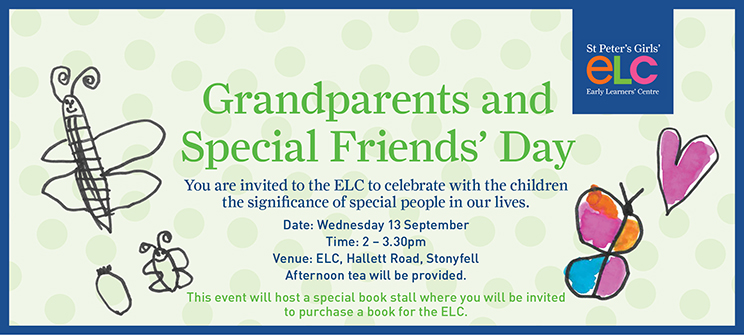
Reception Twilight Tour
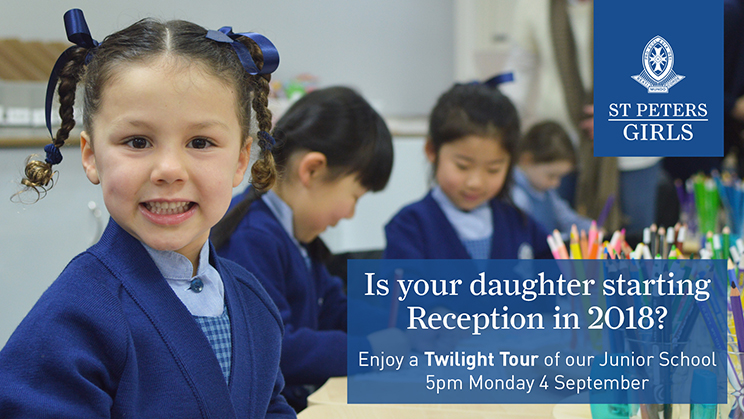
Wellbeing in Young Children
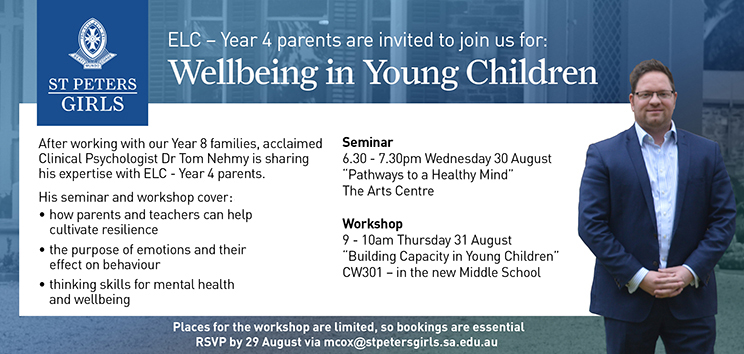
‘Old Scholars’ of the ELC
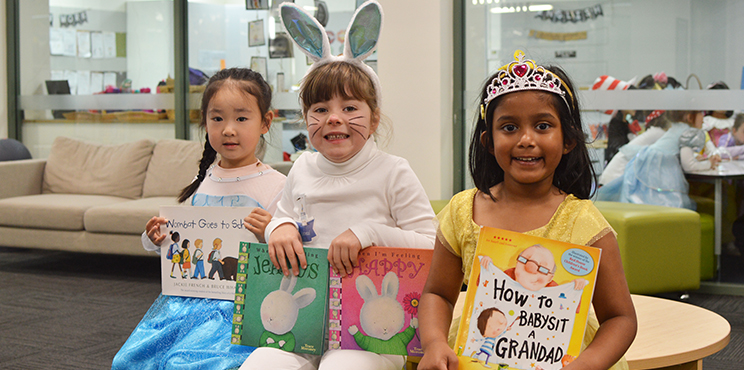
It has been an exciting time for our Mid-Year Reception students as they have experienced life in the “big school” for five weeks! In Week 4, the Book Week parade was held, and the girls enjoyed the opportunity to dress up as a book character. We made a special visit to the Mid-Year Reception room to meet up with ELC “Old Scholars” Jessie, Zara and Aarabi, and captured them all dressed up for Book Week.
In the past couple of weeks, the Old Scholars have been learning various sounds of Jolly Phonics, including Cc.. clicking castanets, Kk.. kites, Ee eggs in the pan, Dd… drum, and practising letter formation. They have been reading some of the children’s stories shortlisted for Book Week, as well as learning how to sequence numbers from 0-20, counting forwards and backwards and identifying missing numbers. Additionally, our Mid-Year Receptions have been learning Chinese and French!
The girls have met Izzy Inquirer and began delving into the Unit of Inquiry, “There are many types of dwellings that people call home” by drawing and labelling their own home and its features. Lastly, the girls have enjoyed visiting their ELC friends on Friday afternoons.
It certainly sounds like life is very busy for our Old Scholars of the ELC! It is great to see them return to the ELC to share their stories with their friends there.
Take a look at this lovely video which highlights the excitement of the girls as they dressed up for the day!
News from the Stonyfell Room
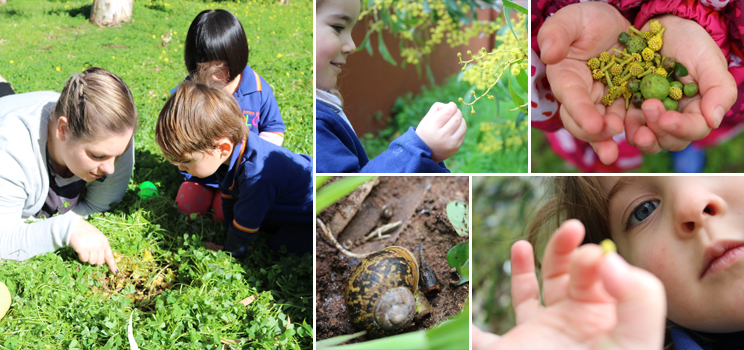
“Knowledge is not rooted in facts; it is rooted in curiosity. One inspired teacher can alter a student for life by instilling curiosity.” – Deepak Chopra
In the Stonyfell Room, we are continuing our PYP inquiry of Ferguson Park through our nature pedagogy. From daily visits into our ‘backyard’ reserve, the children have demonstrated strong curiosities of the many living things that can be found on the ground such as flowers and living insects. As this is so easily accessible to the children, they are able to explore using all their senses, enriching their understanding of the natural world around them.
Through these explorations we have identified elements of empathy that are evident in the children’s emerging attitudes towards these living things. Each visit, the children pick from the bed of yellow flowers, collecting and offering them to other children and educators as a gift. Discoveries of millipedes and the base of the flower beds have also provided insights to our children’s developing empathy, in the manner of which they care for them. After witnessing a millipede curling up from exposure, Lana Rundle commented that it “must be scared” and that we should “cover it back up”. This empathetic skill has been mirrored within the ELC with our worm farms, considering and caring for these living creatures in a similar way.
Our role as educators is to fuel this fascination with as many opportunities to visit the park and be involved in running the worm farms. Provocations throughout the room also allow a flow of learning from Ferguson Park into the ELC to add another layer to their experiences and express learning through a variety of languages. These experiences the children have engaged in have been captured and displayed around the Stonyfell Room for educators, families and children to reflect on.
Emma Veitch and Annabelle Redmond
News from the Bell Yett Room
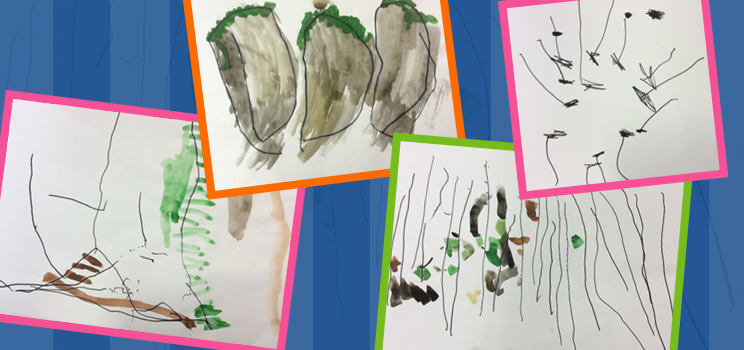
“To foster a love for place, we must engage our bodies and our hearts – as well as our minds.” – Ann Pelo, Author
In the ELC, the children are provided with many materials and mediums through which to give form to their thinking and imagination. We often refer to this as their One Hundred Languages. Our dedicated ateliers (art spaces) provide children with endless possibilities through which to capture their curiosities with the resources provided. We are also regularly joined by Miss Caterina who supports the children in developing the skills and attitudes needed for using the materials.
We have been inviting the children to use mark-making as a language for expressing their thoughts and theories about their interactions with nature. This includes their curiosities about the ants they have encountered in the park, our worm farm and the “Best Friend Tree”. This language gives children the opportunity to stop and pause with their ideas, give them shape and make them relatable to others.
It also supports the research skills we are focussing on developing, including:
• Observation skills – using all the senses to notice relevant details
• Recording data – describing and recording observations by drawing
During our visits to the park and the use of digital technologies such as photographs, videos and projections, we are inviting the children to use all of their senses to carefully observe and then develop their skills through recording these observations.
Our connections to nature through both hands-on explorations and documenting through mark-making, are supporting children in developing their ecological identity. We have begun displaying the children’s mark-making around the room, on the walls and in documentation folders. We invite you to come in and be amazed at their work.
Leanne Williams, Nell Tierney and the Bell Yett Team
News from the Ferguson Room
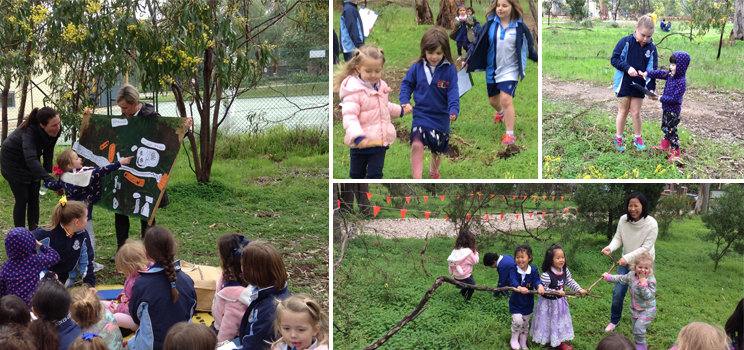
Every second Tuesday, we meet with our Buddy Class, the Year 3s and their teacher, Mr Routley. This is such a wonderful way to connect with the School community and to build relationships with our fellow learners. The children are always so excited to see each other. Recently, we arranged for our buddies to meet us in Ferguson Park. Thankfully the weather was fine, and with the assistance of two of our parents, Meg (mother of Edwina) and Nancy (mother of CiCi), we welcomed the Year 3s to the world we have been exploring and discovering. As we have been doing a lot of work on mapping the park and the special places we have found within it, we asked the older girls to look for a place they and their ELC buddy felt was interesting or beautiful, and to draw it together.
Our overarching intent this term has been to nurture the children’s ecological identity. Simply put, this means to establish a strong connection with the natural environment in our local area, one that will inspire empathy for all that lives within it, and a growing desire to take action to protect it. We know that environmental issues and concerns will always be something for which human beings must take responsibility, and children must understand this from a young age so that they, too can take their place as proactive, globally-minded citizens of the world. The participation of our families in this area of our learning has also been important. Children look to adults as role models, and witnessing the interest and support of the Ferguson Room parents reinforces that their studies with their teachers and peers are of great value.
Next week we will return to the park with our Year 3 buddies and some of our parents, using the maps we have created together to rediscover the special places we found together. As we work with one another, we nurture our relationships with our buddies as well as with the landscape of this special piece of bushland.
Mel Angel
News from the Hallett Room
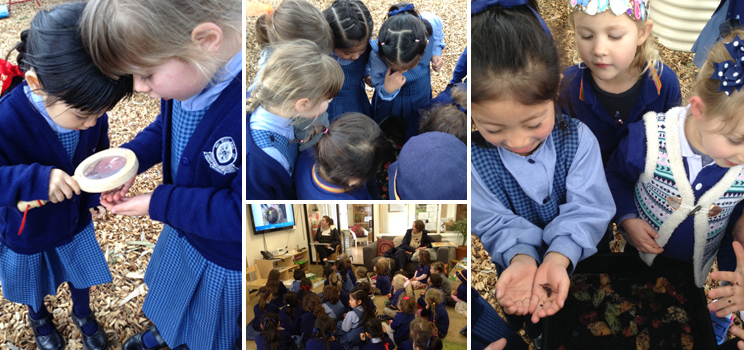
As we see relationships deepening, expanding and changing in the Hallett Room, we begin to see the development of rich collaboration. An important aspect of the Reggio Emilia approach is that of co-construction; how children build knowledge with one another. For us as educators, we aim to initiate some thinking and then encourage the children to expand each other’s ideas and thoughts. As the children become more confident to share their ideas with one another, they become aware that they can also respectfully challenge their peers. We start to hear differing points of view as they question, disagree and negotiate their theories – sometimes changing their perspectives along the way. It is exciting as educators to see this happen, knowing the children are enhancing their research, thinking and inquiry skills. Those all-important skills that build the foundations for lifelong learners.
This week in the Hallett Room, we had this type of collaboration occur during the Buddy session with our Mid-Year Reception friends. As they came to visit us in the ELC, we decided to share our investigation into the Worm Farm. The initial response from some of the Reception children was “YUCK!”
The Hallett children soon changed this perspective!
“Worms aren’t yuck they are fun.”
“We have to be gentle with the worms.”
“You don’t have to touch them.”
As the group of children became more curious about the learning, we started to hear some theories emerge.
“They can eat the fruit scraps.” – Reception friend
“I wonder if they could eat the crust of the bread?”
“They can eat some bread.”
“No, they aren’t allowed bread.”
“Why aren’t worms allowed to eat dairy?” – Reception friend
“They can’t eat milk.”
“Will they vomit?” – Reception friend
“Because they’re not people?” – Reception friend
“Maybe because they eat things that are healthy for them.”
“Worms turn the scraps into dirt.” – Reception friend
“Worms need places that are damp.” – Reception friend
The Hallett children may not have thought about some of those ideas coming from their older peers before. Their own ideas are scaffolded to new levels and are ready to be revisited by educators at another time.
Pam Reid

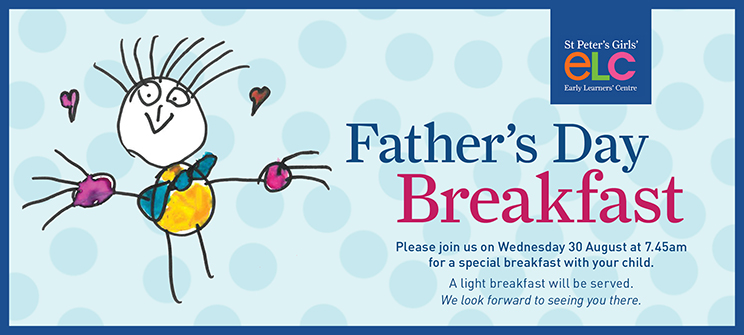
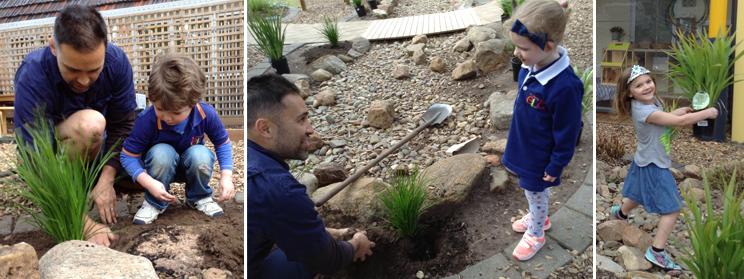
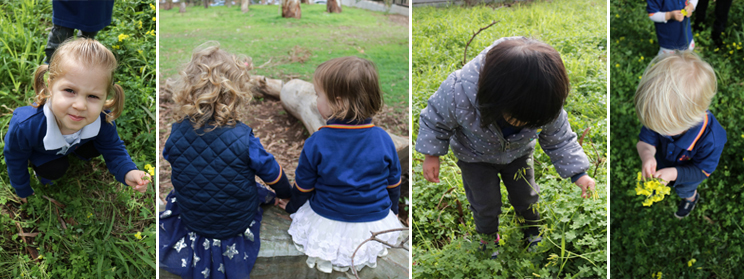
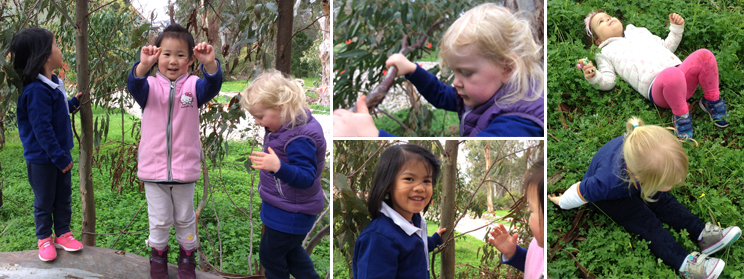 “Isn’t it lovely living here in Ferguson Park.” – Nina-Lucia
“Isn’t it lovely living here in Ferguson Park.” – Nina-Lucia